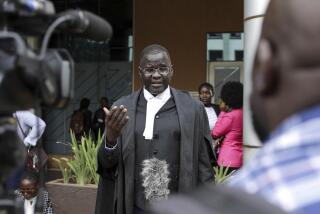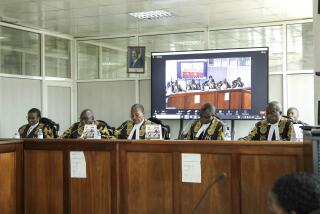‘Call Me Kuchu,’ ‘God Loves Uganda’ shed light on gay-rights fight
As the same-sex marriage debate continues throughout the U.S., another front in the battle over gay rights has emerged thousands of miles away in the East African nation of Uganda, where in 2009 a bill was drafted that would impose the death penalty for certain homosexual behavior and prison time for anyone failing to report gays to the authorities.
In Uganda and throughout parts of Africa, many believe homosexuality to be an imported Western evil, part of a so-called gay agenda. But an irony explored in two new documentaries, “Call Me Kuchu” and “God Loves Uganda,” is that American evangelical groups have helped spread such notions and influenced policy there, including the Anti-Homosexuality Bill.
The films shed light on how a country roughly the size of Oregon and home to 34 million people has become one of the top destinations for American missionaries and ground zero of an international political and religious dispute.
“Call Me Kuchu,” which opens in Los Angeles on June 21, is a portrait of one of the bill’s staunchest opponents, the late activist David Kato, who called himself Uganda’s first openly gay man.
First-time feature directors Katherine Fairfax Wright and Malika Zouhali-Worrall met Kato, whose slight, bespectacled appearance occasionally belied his fierceness, as their liaison to the lesbian, gay, bisexual and transgender community in Kampala, Uganda’s capital.
In a joint phone interview with the directors, Zouhali-Worrall described Kato as one of the most out and outspoken members of the country’s LGBT community. “He stood out from the rest of the community just in what he was prepared to do and how much he was prepared to put himself out there in very dangerous ways,” she said.
The film provides a window into daily life for LGBT Ugandans, or kuchus (a word of their own creation). The Anti-Homosexuality Bill notwithstanding, existing laws dating to British colonial times already criminalize homosexuality in Uganda, though prosecution is rare because offenders must be caught in the act.
CHEAT SHEET: L.A. Film Festival
“Call Me Kuchu” juxtaposes scenes of relative normalcy — Kato tending to his garden, a backyard anniversary celebration, a jubilant drag show — with accounts of discrimination and violence, the kind Kato documents in his work for the umbrella organization Sexual Minorities Uganda.
Kato’s crusade takes him on national television and to a meeting at the U.N. Office of the High Commissioner for Human Rights. He also heads to High Court to sue a local newspaper for publishing an incendiary article claiming to out 100 gay Ugandans — with photographs, addresses and a banner reading “hang them.”
At a crucial moment, Kato’s work and the film itself are nearly overshadowed by a shocking event: his death.
On Jan. 26, 2011, Kato was attacked in his home and bludgeoned with a hammer. He died on the way to the hospital. He was 46. Kato’s killer, who was caught and sentenced to 30 years in prison, said in court he was defending himself from sexual advances, but activists believe the crime was motivated by homophobia.
RELATED: Obama mourns David Kato
Wright said that in the wake of Kato’s murder, “We suddenly felt this incredible onus because we knew that David’s final testimony lay in our footage.” The film does not end there, and neither does Kato’s influence.
Roger Ross Williams, the director of “God Loves Uganda,” said by phone that it was also Kato who encouraged him to focus his film on American evangelicals. (“God Loves Uganda” will screen July 16 at Outfest Los Angeles and open in limited release in the fall.)
Having grown up in the black church while also feeling shut out as a gay man, Williams became interested in Christianity in Africa while shooting a short about a Zimbabwean musician.
Kato was one of the first people Williams met on his new film. He said Kato told him, “Don’t focus on us. Focus on the influence of the American religious right in Uganda because that really needs a spotlight shined on it.”
Williams’ film recounts how in March 2009 a group of American missionaries gave a series of talks in Kampala on such subjects as the threat homosexuals pose to biblical values and how to turn gay people straight. (Their teachings have been widely discredited in the U.S.) One of the missionaries, Scott Lively, addressed parliament for five hours. Parliamentarian David Bahati introduced the bill the following October.
ON LOCATION: Where the cameras roll
Since its introduction, the bill has never been voted on in parliament, and President Yoweri Museveni, who has faced intense international pressure on the issue, would likely veto it. Still, the bill continues to linger in parliament under the heading “Business to Follow.”
Some evangelical groups have distanced themselves from the legislation. One missionary in “God Loves Uganda” says, “We don’t know all the details of the bill, even. We’ve never read it. What we’ve heard is what the Western media has said about it.”
Williams said there are a number of reasons why Uganda has proven to be fertile soil for American evangelicals. The fall of the dictatorial regime of Idi Amin in 1979 left the country wracked by civil war, and HIV/AIDS reached epidemic levels in the ‘80s. During that time, American evangelical groups previously banned under Amin came above ground and helped administer aid.
The director also noted that Uganda is one of the youngest countries in the world; nearly 49% of the population is younger than 15. An estimated 85% of the population is Christian, compared with 63% for the whole of sub-Saharan Africa.
Evangelicals “have rebuilt that country, built schools and hospitals,” Williams said. “They’ve done a lot of great work in Uganda — but along with that comes a certain ideology, a certain religious belief.”
That said, after following evangelicals in Uganda for three years, the thing that surprised Williams most was how he and his subjects began to understand one another. “The walls that divided us started to come down,” he said. “I think that shows that there’s hope.”
More to Read
Only good movies
Get the Indie Focus newsletter, Mark Olsen's weekly guide to the world of cinema.
You may occasionally receive promotional content from the Los Angeles Times.






